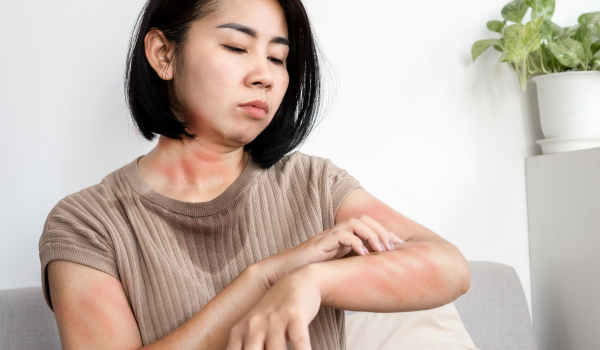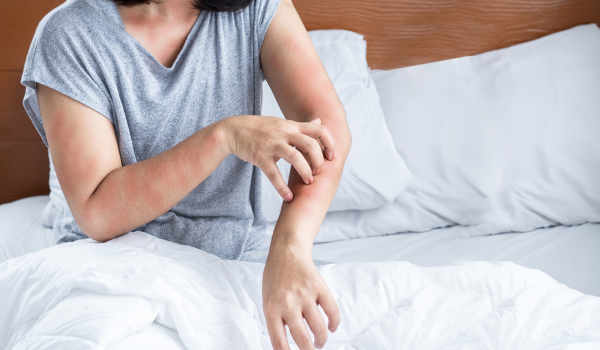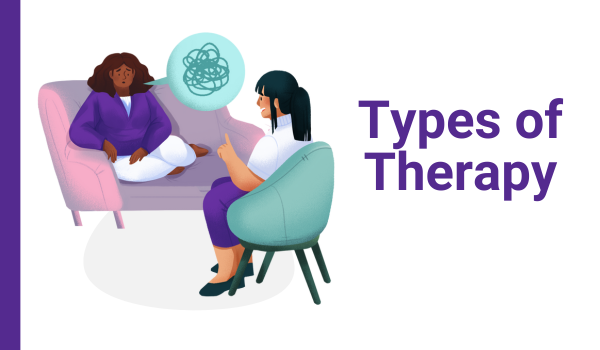Can Stress Cause Rashes or Hives? Symptoms and Treatments

You may develop stress-induced urticaria (hives) if you are experiencing a lot of stress. Stress can also trigger skin conditions like eczema, which causes itchy rashes. Your body releases a hormone called cortisol in response to emotional stress. Cortisol may also cause your body to release histamine, a chemical that triggers skin reactions like hives and a rash.
Everyone experiences stress, and stress-induced hives and rashes may be more common than you think. Not only can stress exacerbate skin conditions, but emotional distress can also lower the threshold for itchiness. Severe stress can make you feel itchiness more intensely.
Stress Rashes
A stress rash is any skin flare-up triggered by stress. It typically causes symptoms such as:
-
Blisters
-
Itchiness
-
Pain
-
Raw skin
-
Skin irritation
-
A red rash in people with lighter skin tones, or a gray, purplish, or dark brown rash in people with darker skin tones
Stress can lead to skin inflammation, resulting in rashes, especially in individuals with conditions like eczema or psoriasis. Common causes of stress include:
-
The death of a loved one
-
Financial difficulties
-
Illness
-
Major life changes, such as marriage, divorce, having a baby, starting or losing a job
-
Relationship problems
Stress-Induced Hives
Hives are itchy welts that can vary in size and appear anywhere on the body. Stress hives often resemble small, swollen mosquito bites.
Other symptoms of hives include:
-
Red or pink bumps in people with lighter skin tones, and lighter or darker bumps than the surrounding skin in people with darker skin tones
-
Burning or stinging sensations
-
Itchiness
-
Warm skin
Stress prompts the body to release cortisol, which can sometimes trigger the release of histamine. Other factors that can cause histamine release include:
-
Allergies
-
Extreme temperatures (hot or cold)
-
Pressure from scratching or tight clothing
-
Sunlight exposure
Treatment Options
Stress rashes and hives are usually temporary and often resolve on their own within 24 hours, although new patches can appear in different areas. At-home treatments you can try include:
-
Applying cortisone cream to reduce inflammation and itching
-
Reducing stress through mindfulness, cutting back on screen time, or taking walks outdoors
-
Avoiding heat and tight clothing that may irritate the affected area
-
Taking antihistamines such as diphenhydramine (Benadryl) or cetirizine (Zyrtec), while noting potential side effects like drowsiness
If home remedies are not effective, visiting a dermatologist may be necessary. Stronger treatments, such as prescription antihistamines or cortisone creams, may be recommended, particularly for thicker-skinned areas like the hands or feet where over-the-counter creams are less effective.
Why Does the Body React to Stress This Way?
When stressed, the body undergoes a chemical response that can cause skin inflammation. Stress activates the hypothalamus-pituitary-adrenal (HPA) axis, which results in the release of cortisol, other stress hormones, and mast cells. Mast cells produce histamine, a chemical that contributes to itchy, irritated skin.
Although the exact mechanism linking stress hormones to skin reactions isn't fully understood, treatments are available to manage these symptoms effectively.
When To See a Healthcare Provider
Most stress-related hives and rashes improve with home care. However, you should see a healthcare provider if:
-
Home treatments do not work
-
You develop additional symptoms such as fever, joint pain, signs of infection like red streaks, swelling, tenderness, or a sore throat
Seek emergency medical attention if the rash is accompanied by severe allergic reactions, such as swelling of the face, tightness in the throat, or difficulty breathing.
A Quick Review
Stress can contribute to rashes or hives. Practicing self-care methods like meditation and exercise may help reduce symptoms. If self-care isn't enough or if you're concerned about your symptoms, reach out to a healthcare provider. They can guide you toward an effective treatment plan to help soothe your skin and manage your stress.


















.webp)
.webp)
.webp)



